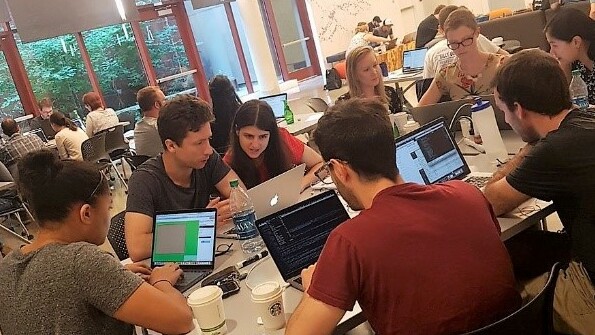Hackathon Combines Neuroscience and Data Science
"The amount of data a student can collect in a single afternoon today is greater than what their mentor could collect in a whole year when they were students."
Dr. Ariel Rokem recalls being told this maxim by fellow colleague Dr. Ione Fine. Data in quantities unimaginable even a decade ago are now available to scholars across all disciplines, creating both opportunities and challenges for emerging researchers.
As a graduate student facing massive quantities of data in his own line of work, Rokem taught himself emerging data science methods. But the methods he was able to teach himself were time-consuming, cumbersome. There had to be a better way.
Grassroots movements developing open-source software and teaching people data science methods have been in existence since the late 1990s. Rokem became involved with the Neuroimaging in Python community and a group called Software Carpentry. There was a clear need for programs that could train people who come from fields with lots of data, but not a lot of traditional training in data science methods. Inspired by his experience in these open-source learning communities, Rokem began thinking of ways to train more emerging researchers in data science methods.
At an open-source software conference in Austin in 2015, Rokem met Dr. Tal Yarkoni, a psychologist and data scientist from UT Austin (Yarkoni is now a data scientist at Twitter). The two got to talking, and then organizing, and in 2016, the eScience Institute at the University of Washington debuted the first neuroscience-focused hackathon week, called "NeuroHackweek."
The program steadily grew--the next year, Rokem and Yarkoni received the first round of funding for NeuroHackweek from the National Institute of Mental Health. The program outgrew the eScience space in the Physics/Astronomy Tower, and moved to Alder Hall commons. "NeuroHackweek" was rebranded into "NeuroHackademy," a summer school in neuroimaging and data science where participants learn all things neuroscience data and analysis.
When the COVID-19 pandemic shut down the entire world in 2020, Rokem and his collaborators pivoted to an online format. With the geographic barrier eliminated, 1,400 people signed up for the one-week training. In 2021, the program, now co-organized by eScience Data Scientist Noah Benson together with Jane Koh, a Program Manager at eScience, was still offered online, this time two weeks long--one week focused on lectures teaching the basics of data science, the second week a Hackathon.
The continued growth of NeuroHackademy is a testament to the instructors' and organizers' abilities to teach a skillset in such high demand, but also a product of the program's focus on diversifying data science. "We really want this to change the face of academic data science," says Rokem. "It's not a very diverse field, and we are losing many important contributors to a host of factors. We try to make this hackademy as welcome, supporting, and diverse as possible."
Rokem credits NeuroHackademy with expanding his perspective on academic research. Academic conferences, Rokem notes, have a competitive and formal atmosphere. But with Hackathons, it's all about open collaboration and interdisciplinary thinking, skills that are crucial in today's interconnected world. Thanks to his work organizing NeuroHackademy, Rokem has also been involved in reshaping ways of thinking about training on a national and international level.
This summer, NeuroHackademy will be back for its 7th year in a hybrid format from July 25th to August 5th, featuring instructors from universities across the world. Committed to broadening the reach of data science methods, Rokem also co-wrote a book about neuroimaging and data science with Yarkoni, which, in the spirit of open collaboration, is available free online.
“Our hope is that NeuroHackademy will enable participants to do better research when they return back to their labs, equipped with new methods and skills. At the same time, we also intend to train a cohort of researchers who are excited to take an active part in the open science community and to contribute their work back into the open-source software eco-system” says Rokem.
To learn more about NeuroHackademy, please visit https://neurohackademy.org/.
